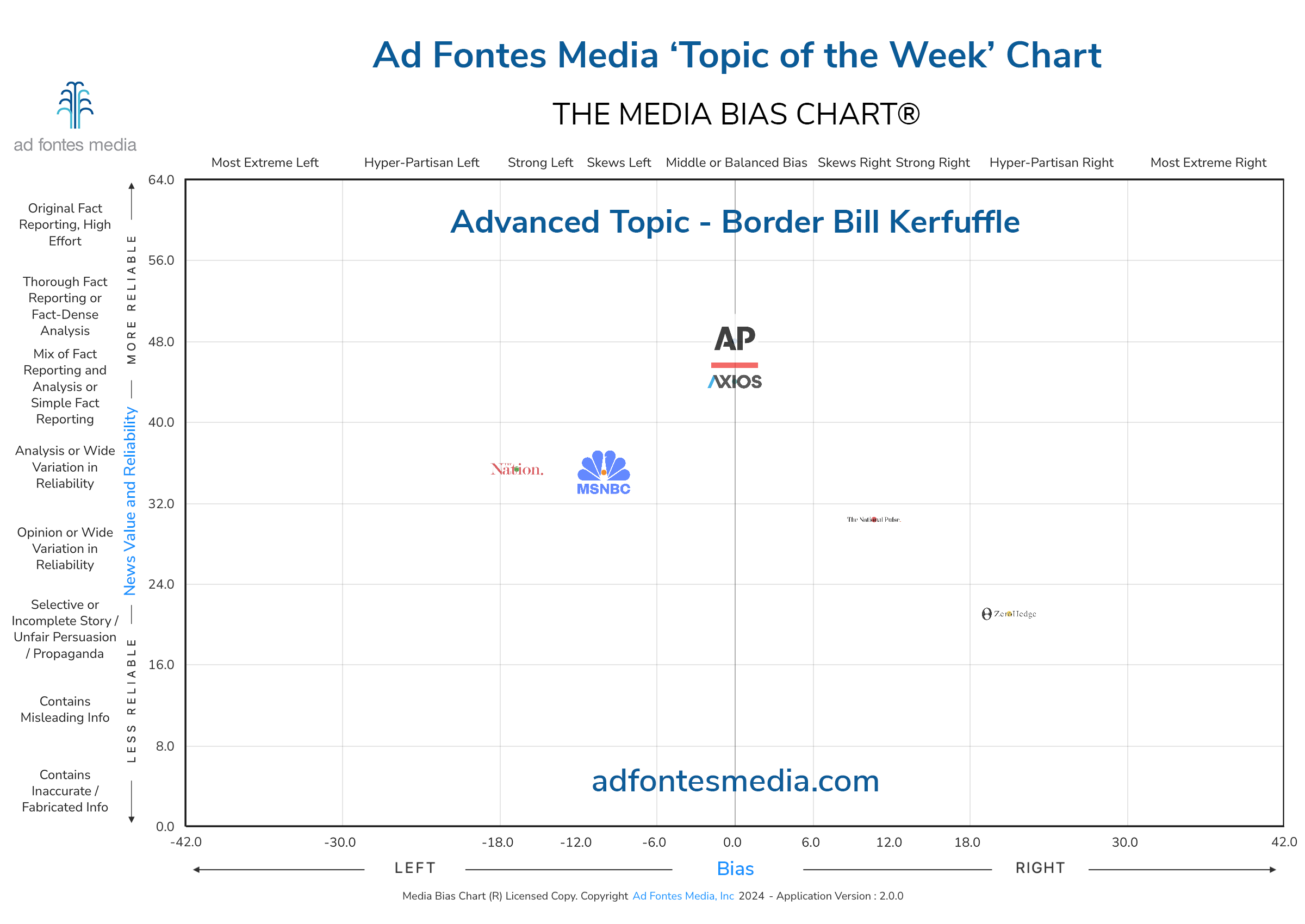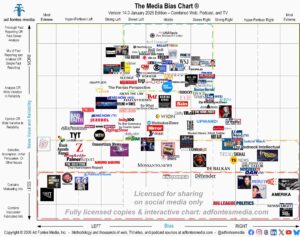
The GOP’s Dissension on Funding for Ukraine and U.S Border Security Rocks the Senate
Author:
Sara Webb
Date:
02/16/2024
A monumental bipartisan effort was about to pay off in the form of a border security bill that the GOP insisted accompany any funding for Ukraine or Israel, but negotiations fell apart when presidential hopeful Donald Trump pushed Republicans to drop support of the bill. In the words of the Associated Press, “There is a story of a president [Biden] willing to anger his own party’s activist class in an election year, rare hope for bipartisan progress on one of the third rails of American politics, and a sudden, stunning collapse publicly engineered by Trump …” Our analysts took a closer look at media coverage of this issue in our Topic of the Week.
Each week, Ad Fontes Media chooses a widely covered trending news topic to share insight into how our analysts rank news coverage for the Media Bias Chart®. To do this, we select six articles reporting on the same story from different outlets to show how each treated the subject. Once we choose a set of articles, pods of analysts with diverse political perspectives (one right leaning, one center, and one left leaning) read each article and use Ad Fontes Media’s content analysis methodology to determine its bias and reliability. These ratings inform the articles’ placement on that week’s special Media Bias Chart.
Our analyst team took a closer look at several articles about the border bill from various media outlets: “Biden determined to use stunning Trump-backed collapse of border deal as a weapon in 2024 campaign” from the AP, “Schumer gives Senate GOP “the night” to decide on Ukraine aid” from Axios, “Scandalous Senate ‘Deal’ Allows 1.5 Million Illegals Per Year, Slides Up To $2.3B To NGOs Trafficking Them, And Gives $60B To Ukraine” from ZeroHedge, “What the F^&$ Happened to the Border-Security Bill?” from The Nation, “GOP rejects the best border offer they’ve ever seen, will ever get” from MSNBC, and “SUMMARY: Senate ‘Border Bill’ Has MASSIVE Handouts for Ukraine & Israel, Little for Border Security, and Authorizes MORE Migration” from The National Pulse.
The bias and reliability scores for each of these articles can be found on our Topic of the Week page. We will be looking closer at the articles from the MSNBC website and The National Pulse, which had remarkably similar scores, just on opposite sides of the dividing bias line.
Our analysts have rated the MSNBC website with an aggregate score of -14.13 for bias, giving it a “strong left” lean, and 34.39 for reliability, placing it in the “analysis or wide variation in reliability” area of the chart. This week’s article was rated at -10 for bias, or “skews left,” and 35 for reliability, in the same “analysis or wide variation in reliability” category.
The MSNBC article vacillates between scathing rebuke and flabbergasted dumbfoundedness, placing the “odds of Democrats presenting Republicans with a comparable opportunity again” on immigration and border security at “roughly zero.” Aside from the article’s blatant shaming that Trump was allowed to tank what had been weeks of careful bipartisan negotiation, it states: “GOP leaders said they’d make it easier for Russia to take part of Eastern Europe by force unless Democrats agreed to a dramatic overhaul of the nation’s border policies. Democrats, convinced that they had no choice, not only agreed to negotiate for months, they also gave up on the one thing they wanted in an immigration deal, and then grudgingly endorsed the most conservative reform package in decades … Republicans then rejected the deal they asked for.”
The article calls out the Republican party as a whole and questions what this writ for their future, positing that future GOP lawmakers will be much more hesitant to participate in similar deal making, since the threat that their own party would zero out their efforts has already come true.
Our analysts have given The National Pulse an aggregate score of 18.83 for bias, pushing it into the “hyper-partisan right” category, and 16.97 for reliability, placing it in the “selective or incomplete story/unfair persuasion/propaganda” layer of the chart. This week’s article was rated more favorably at 10.67 for bias, pushing it into the “skews right” category, and 30.33 for reliability, placing it in the “opinion or wide variation in reliability” layer of the chart.
This article’s use of “MASSIVE handouts” in the title smacks of clickbait, and it proceeds to share misinformation that has circulated about the bill, claiming that it “includes much in the way of assisting more migrants into the United States.” The article sticks to popular Republican platform talking points that the U.S. is too lenient on immigration, to the detriment of our citizens, and it closes with a selected list of some of the points contained within the 370-page bill.
The Fact Check.org website disputes some of the claims made in this article, breaking down the social media claims about the Senate bill: “Leading up to the vote, House Majority Leader Steve Scalise on social media said the bill ‘accepts 5,000 illegal immigrants a day.’ … Although that is the threshold for mandatory activation of the emergency authority, the bill also would have extended ‘discretionary activation’ to the Homeland Security secretary once there is an average of 4,000 or more encounters over seven consecutive days. Customs and Border Protection provides only monthly data, and looking at data during the Trump administration, the number of encounters would have reached that threshold in May 2019, when encounters averaged 4,286 per day.”
The two articles from MSNBC and The National Pulse were rated as near to the exact opposite as possible on the Media Bias Chart, but they are so very different in their approaches. Each article fills in some of the details of the bill and the negotiations, but from there they diverge quite a bit.
The MSNBC piece postulates that the bill’s failure not only hurts global security but also the future of the GOP’s willingness to work for the good of its own party. The National Pulse article grabbed onto the GOP party line that immigration is out of control and that the bill would have paved a road between the U.S. and Mexico — and it neglected to mention Donald Trump at all.
What do you think? Do you agree with where our analysts placed these articles on the chart?
If you want a look at the larger media landscape or are curious to see how our analysts have rated your favorite sources, head over to our website and check out the resources we have available. And don’t forget to come back for another examination of our Topic of the Week.
If you want to stay informed on all of our amazing work, join our free mailing list!


